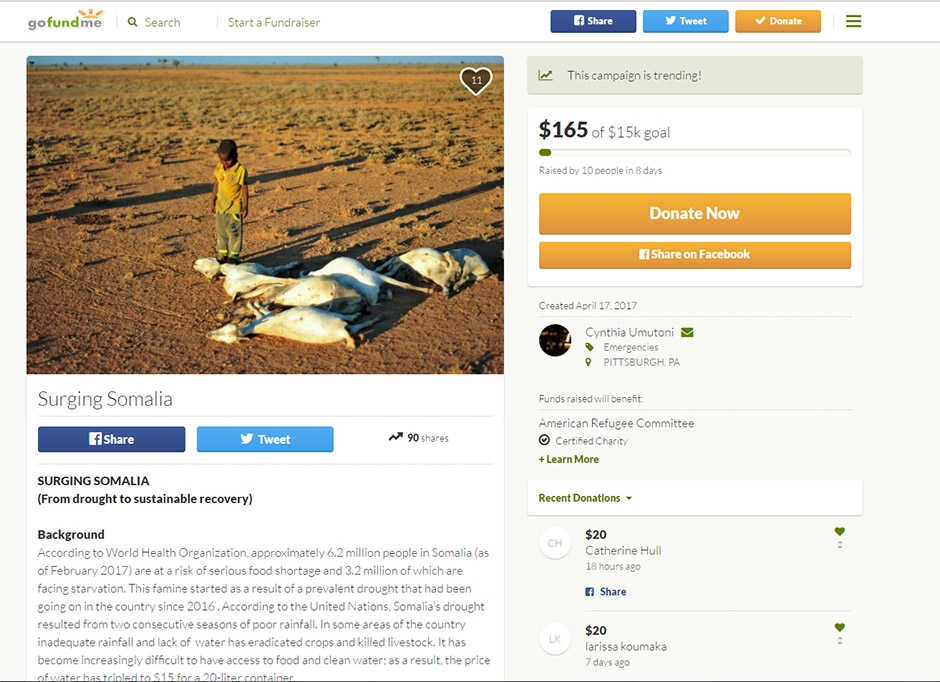
A photo of the “Surging Somalia” gofundme page, an effort started by DU students.

A photo of the “Surging Somalia” gofundme page, an effort started by DU students.
Raymond Arke | Asst. News Editor
A dire United Nations report showed more than half the population of Somalia is in danger of starvation, and Duquesne students half a world away are helping out.
Cynthia Umutoni, a sophomore international business and finance major, and Aminata Soko, a senior accounting major, are running a fundraiser to benefit struggling Somalis. The money goes to the American Refugee Committee, a volunteer relief group who has an office in Mogadishu, Somalia.
The idea for a holding a fundraiser was spur of the moment for the two students.
“The idea came randomly. We were going to get dinner and [Aminata] told me ‘Cynthia did you see what’s going on in Somalia?’ … And I was like ‘Can we do something about it?’” Umutoni said.
Soko then came up with the plan to start an online fundraiser.
“We just felt how fortunate we are to have basic food and water, things like that. Just knowing there are people out there who don’t have that, it’s just crazy to us … Being at the university, we thought it was a great place to start [a fundraiser],” Soko said.
By starting this effort, Umutoni hopes that they can help just a few Somalis from suffering.
“As college students we don’t have the means to immediately stop the famine in like two days. The little we can do I’m sure can benefit a few families,” she said.
Another important aspect of their efforts is that they hope more students and, people in general, will start paying attention to what’s going on.
“Creating the awareness … just letting people know that OK this is happening in the world. There are people dying of hunger, we need to know about this. I think that’s the first step towards trying to make change,” Soko said.
Umutoni said it’s upsetting to see extensive TV coverage of tragedies around the world but nothing actually happening to stop them.
“It’s sad to see that happen. We just feel like contributing to making Somalia a little bit better, however much we can,” she said.
The situation is getting dire. Umutoni said that it is “one of the biggest crisis the UN has faced.”
“It’s very real. It is creating refugees that are going to neighboring countries like Kenya and South Sudan,” she said.
The fundraiser can be found on the crowdsourcing website, GoFundMe, and is titled “Surging Somalia.” The two students have been sharing the link across Facebook.
They want students to know that these Somalis are just like anyone else.
“The people who are being affected are somebody’s family,” Umutoni said.
Soko asked students to reflect on how lucky they are.
“Think about what they have and really sit down and appreciate it. These people are struggling to find the minimum,”she said.
The fundraiser has raised $145 in one week.
Somalia facing devastation coupled with fundraising campaigns to help is nothing new, according to Fr. John Sawicki, director and professor of international relations at Duquesne.
“The story of Somalia is the story of donor fatigue,” he said.
The current famine harkens back to the 1992 civil war and famine, which needed massive UN assistance. But now, it’s different.
“[The country] doesn’t get the star power as it did in 1992 … [but] the malnutrition and famine is as bad as ‘92” Sawicki said.
Somalia has been scarred by decades of conflict, he explained.
“There has always been intense and bitter competition between various [Somali] clans,” Sawacki said.
Terror groups run deep within the region, some being renowned for their deadliness — especially the Somali-based group Al-Shabab.
“Until ISIS, Al-Shabab was the most impressive terror group … [they were] a rockstar in the global terrorist movement,” Sawicki said.
Sawicki explained that the prevalence of terror groups has left the government almost nonexistent. African Union troops have tried to support order of years, but their contract with the UN is running out and Sawicki expects problems.
“If African peacekeepers go … this may be the moment for Al-Shabab to release what they have in reserve,” he said, reminding that it is still just speculation.
Sawicki lauded the students running the fundraiser, calling the American Refugee Committee “very reputable.”



